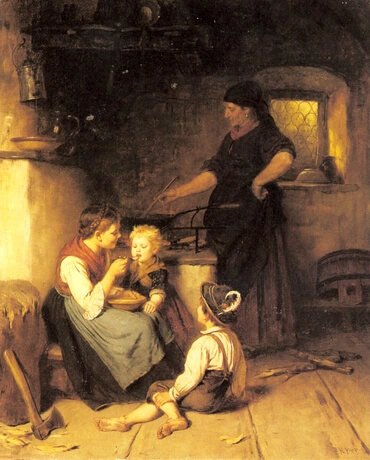4169. 'Your sheep and your she-goats have not miscarried' means its state as regards good and the good of truth. This is clear from the meaning of 'sheep' as good, dealt with below, and from the meaning of 'she-goat' as the good of truth, dealt with in 3995, 4006. The word good when used by itself means the good of the will, whereas the expression the good of truth means the good of the understanding. The good of the will consists in doing good from good, whereas the good of the understanding consists in doing it from truth. To people who do good from truth those two activities seem to be one and the same, when in fact they are considerably different from each other. For doing good from good consists in doing it from the perception of good, and that perception does not exist with any except those who are celestial. But doing good from truth is doing it from knowledge and consequently from the understanding. It amounts to doing it without any perception that it is good, and so solely as something that a person has been taught to do by others, or else by the exercise of his own intellect has decided that it is good. Such truth may well be faulty, but if it has good as its end in view, then a person's action arising out of that truth becomes tantamount to good.
[2] 'Sheep' means goods. This may be seen from many places in the Word, from which places let merely the following be quoted: In Isaiah,
He was afflicted, yet he did not open his mouth. He is led like a lamb 1
to the slaughter, and like a sheep before its shearers, he did not open his mouth. Isaiah 53:7.
This refers to the Lord, where He is compared to 'a sheep' not by virtue of truth but of good. In Matthew,
Jesus said to the twelve whom He sent out, Do not go into the way of the gentiles, and do not enter any city of the Samaritans; go rather to the lost sheep of the house of Israel. Matthew 10:5-6.
'The gentiles' to whom they were forbidden to go stands for those among whom evils exist - 'gentiles' meaning evils, see 1259, 1260, 1849; 'the cities of the Samaritans' stands for those among whom falsities are present; and 'sheep' stands for those among whom forms of good may be found.
[3] In John,
Jesus after the Resurrection said to Peter, Feed My lambs. A second time He said, Feed My sheep; the third time He said, Feed My sheep. John 21:15-17.
'Lambs' stands for those who have innocence within them. The first reference to 'sheep' stands for people whose practice of good stems from good, the second for those whose practice of it stems from truth. In Matthew,
When the Son of Man comes in His glory He will place the sheep at His right hand but the goats at His left. And He will say to those at His right hand, Come, O blessed of My Father, possess as an inheritance the kingdom prepared for you from the foundation of the world; for I was hungry and you gave Me food, I was thirsty and you gave Me drink, I was a stranger and you took Me in, I was naked and you clothed Me, I was sick and you visited Me, I was in prison and you came to Me. Insofar as you did it to one of the least of these My brothers you did it to Me. Matthew 25:31-40.
Here it is quite plain that 'sheep' stands for goods, that is, for those in whom good is present. Every kind of good flowing from charity, which will in the Lord's Divine mercy be described elsewhere, is included here in the internal sense. 'Goats' means in particular those who have faith but no charity.
[4] Similarly in Ezekiel,
As for you, O My flock, said the Lord Jehovih, Behold, I am judging between one member of the flock and another, between rams of the sheep, and he-goats. Ezekiel 34:17.
'He-goats' means in particular those whose faith is not linked to any charity. This becomes clear from the meaning of 'he-goats' in the good sense as those who possess the truth of faith and from this some charity, but in the contrary sense those whose faith is not linked to any charity. Such people reason about salvation from basic assumptions that faith is what saves. The same point is apparent from what the Lord says about the goats in the passage in Matthew quoted above. But people who do not possess any truth of faith, or at the same time any good of charity, are carried away into hell without undergoing any such judgement, that is to say, without any examination to prove that they are governed by falsity.
Poznámky pod čarou:







